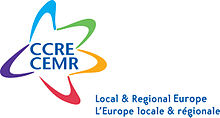
Local government is a generic term for the lowest tiers of governance or public administration within a particular sovereign state.

The European Union created a Committee of the Regions to represent Regions of Europe as the layer of EU government administration directly below the nation-state level. The committee has its headquarters in Brussels.
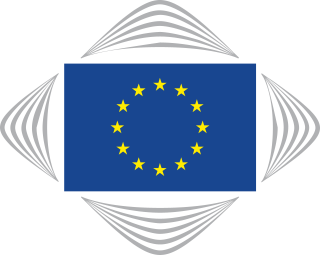
The European Committee of the Regions (CoR) is the European Union's (EU) assembly of local and regional representatives that provides sub-national authorities with a direct voice within the EU's institutional framework.
A supranational union is a type of international organization and political union that is empowered to directly exercise some of the powers and functions otherwise reserved to states. A supranational organization involves a greater transfer of or limitation of state sovereignty than other kinds of international organizations.
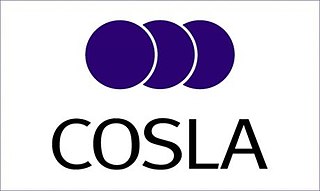
The Convention of Scottish Local Authorities (COSLA) is the national association of Scottish councils and acts as an employers' association for its 32 member authorities.
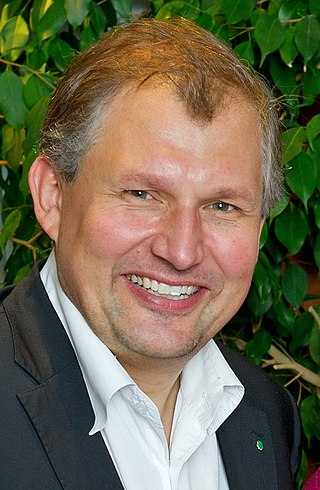
Terje Riis-Johansen is a Norwegian politician for the Centre Party.
Multi-level governance is a term used to describe the way power is spread vertically between levels of government and horizontally across multiple quasi-government and non-governmental organizations and actors. This situation develops because countries have multiple levels of government including local, regional, state, national or federal, and many other organisations with interests in policy decisions and outcomes. International governance operates based on multi-level governance principles. Multi-level governance can be distinguished from multi-level government which is when different levels of government share or transfer responsibility amongst each other. Whereas multi-level governance analyses the relationship of different state levels and interaction with different types of actors.'
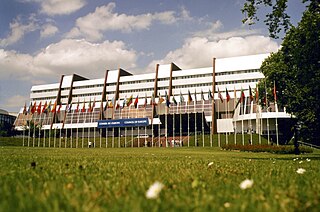
The Congress of Local and Regional Authorities is the pan-European political assembly representing local and regional authorities from the forty-six member states of the Council of Europe. Its role is to promote local and regional democracy, improve local and regional governance and strengthen authorities' self-government, according to the principles laid down in the European Charter of Local Self-Government. It is made up of two chambers, the Chamber of Local Authorities and the Chamber of Regions and holds its plenary sessions twice a year at the Palace of Europe in Strasbourg, where its permanent Secretariat is located.
The Council of European Municipalities and Regions launched in May 2006 a European charter for equality of women and men in local life. This charter is addressed to the local and regional governments of Europe, who are invited to sign it, to make a formal public commitment to the principle of equality of women and men, and to implement, within their territory, the commitments set out within the Charter.
The Chamber of Local Authorities is one of the two Chambers of the Congress of Local and Regional Authorities of the Council of Europe. The Chamber is the voice of local authorities in the Council of Europe. It consists of 306 representatives from the Council's 46 member states, who either hold a general local authority mandate from direct elections or are politically accountable to a directly elected assembly. The Chamber provides an opportunity for local officials to discuss common concerns, share their experiences and develop relevant policies.
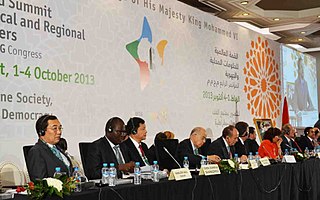
United Cities and Local Governments (UCLG) is an umbrella international organisation for cities, local and regional governments, and municipal associations throughout the world that is concerned with representing and defending the interests of local governments on the world stage.

Telemark County Municipality was the regional governing administration of the old Telemark county in Norway. The county municipality was established in its current form on 1 January 1976 when the law was changed to allow elected county councils in Norway. The county municipality was dissolved on 1 January 2020, when Telemark was merged with the neighboring Vestfold county, creating the new Vestfold og Telemark county which is led by the Vestfold og Telemark County Municipality.
The Covenant of Mayors is a European co-operation movement involving local and regional authorities. Signatories of the Covenant of Mayors voluntarily commit to increasing energy efficiency and the use of renewable energy sources on their territories. By their commitment, they support the European Union 20% CO2 reduction objective to be reached by 2020.
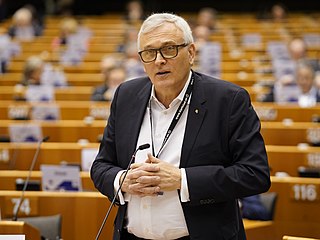
Klas Anders Knape is a Swedish conservative politician. He served as the President of the Congress of Local and Regional Authorities (CLRAE) of the Council of Europe between November 6, 2018 and March 23, 2021. He was president of the Swedish Association of Local Authorities and Regions (SALAR), from 2007 to 2015 and again from 2019 to 2022. He was also a councillor of the Karlstad Municipality.
ARLEM is a permanent, joint assembly, bringing together local and regional authorities from the three shores of the Mediterranean. This assembly is designed to provide an institutional framework to bring together CoR members and representatives of European associations involved in Euro-Mediterranean co-operation with their counterparts from the Mediterranean partners in a permanent joint body.

Andreas Kiefer is an Austrian politician. Since 2010, he is Secretary General of the Congress of Local and Regional Authorities of the Council of Europe, an institution representing local and regional authorities of the 47 member states of the Council of Europe.
The Charter of European Sustainable Cities and Towns Towards Sustainability otherwise known as the Aalborg Charter (1994) is an urban environment sustainability initiative approved by the participants at the first European Conference on Sustainable Cities & Towns in Aalborg, Denmark. It is inspired by the Rio Earth Summit’s Local Agenda 21 plan, and was developed to contribute to the European Union’s Environmental Action Programme, ‘Towards Sustainability’.

The Juncker Commission was the European Commission in office from 1 November 2014 to 30 November 2019. Its president was Jean-Claude Juncker, who presided over 27 other commissioners. In July 2014, Juncker was officially elected to succeed José Manuel Barroso, who completed his second five-year term in that year.
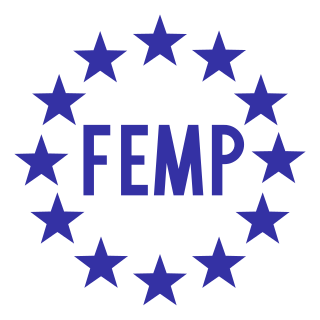
The Spanish Federation of Municipalities and Provinces (FEMP) is an association of local governments in Spain for the purpose of representing the interests of local government to other government authorities. In June 2023, there were 7,324 members of a potential 12,060.
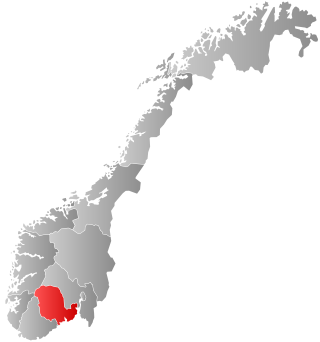
Vestfold og Telemark was a county in Norway, which existed from 1 January 2020 to 31 December 2023. The county was the southernmost one of Eastern Norway and consisted of two distinct and separate traditional regions: the former counties of Telemark and Vestfold. The capital was located in the town of Skien, which was also the county's largest city. While Skien was the seat of the county municipality, the seat of the County Governor was Tønsberg. It bordered the counties of Viken, Vestland, Rogaland and Agder until its dissolution.
